Blog
- Details
- Hits: 63
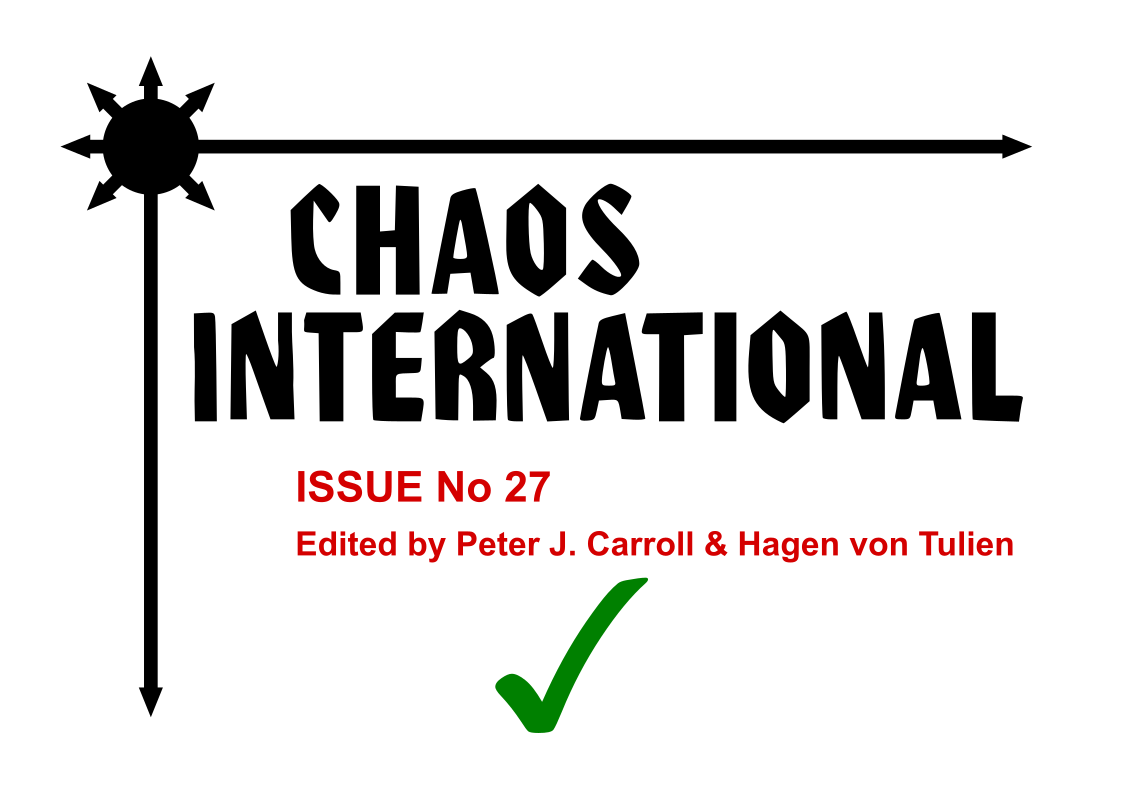
Chaos International Will Continue! Plus, we plan another Chaos Anthology!!
Firstly - Chaos International.
We now have a UK Publisher prepared to try this as an annual book sized publication.
We intend to preserve the ‘Alternative Magazine’ style of Chaos International.
Nothing Remains Off-Limits, Anything Considered.
We seek a variety of contributions: -
Articles about your activities and thoughts in the Esoteric, Occult, Metaphysical, and Off-White Magical fields.
Poetry, Rituals, Reviews, Prophecy, Visions, Speculation, Mad or Alternative Science, Confirmation or Falsification of Conspiracy, Satirical, Edgy and Controversial material.
Artwork (b/w), Occult Erotica, Cartoons, Metaphysical & Visionary Imagery.
We shall also include a selection of classic gems from previous editions with permission from their creators.
Contributors may advertise their services and products. Accepted contributors will receive a complimentary copy, and retain their copyright on their creations.
Secondly – Another Chaos Anthology.
Following the success of ‘This is Chaos’ our American Publisher has expressed an interest in doing another anthology of a similar type.
For this we seek about 15 chapter length articles on various topics related to Chaos Magic and Philosophy.
Contributors will receive complimentary copies and a payment for accepted contributions.
Submissions – For either or both projects send either your contribution, extracts, or a proposal for a contribution to BOTH editors: -
Peter J Carroll
Cosmological Gravitational Redshift
In Hypersphere Cosmology, the redshift of distant galaxies arises from the effect of gravity on light traveling huge distances, rather than from an expansion of the universe as in conventional LCDM Big-Bang Cosmology.
Newton’s Shell Theorem combined with Einstein’s General Relativity indicates that such a Cosmological Gravitational Redshift effect will occur.
Newton’s Shell Theorem demonstrates two things, firstly that a massive spherically symmetric body affects external bodies as though all of its mass acts from its centre point, and secondly that a massive spherically symmetric hollow sphere exerts no net gravitational force on any body inside of it, regardless of that body’s position.
As the universe seems fairly homogenous and isotropic on a large intergalactic scale, we can regard any vast spherical volume of space as both hollow and massive, despite its rather low overall density.
Thus observers should consider themselves located on the surface of a sphere surrounding any distant galaxy they choose to observe and expect to observe a redshift which depends on its distance and all the mass laying within such a sphere.
Thus although observers will not notice a net cosmological gravitational pull form any direction, they will notice that all incoming light from very distant sources becomes redshifted to an extent dictated by the sphere of mass defined by the radius of the distance to those far sources.
This effect should occur in any non-expanding universe, whether hyperspherical or infinite in extent.
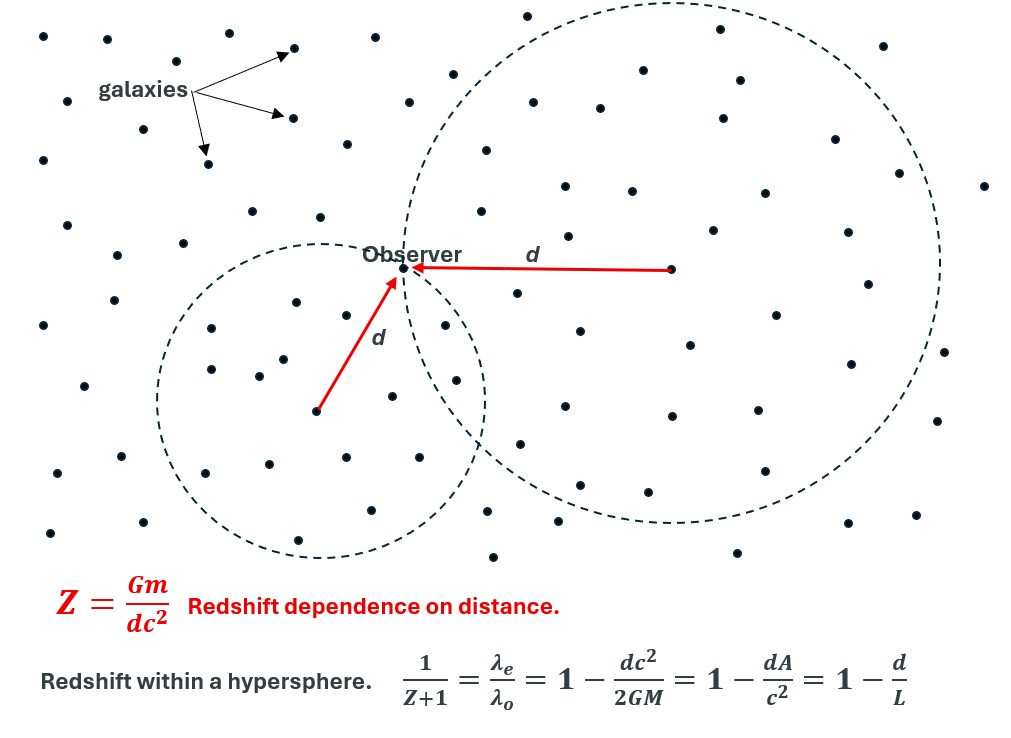
- Details
- Hits: 406
Feblog 2026
Chaos International Issue 27 ?
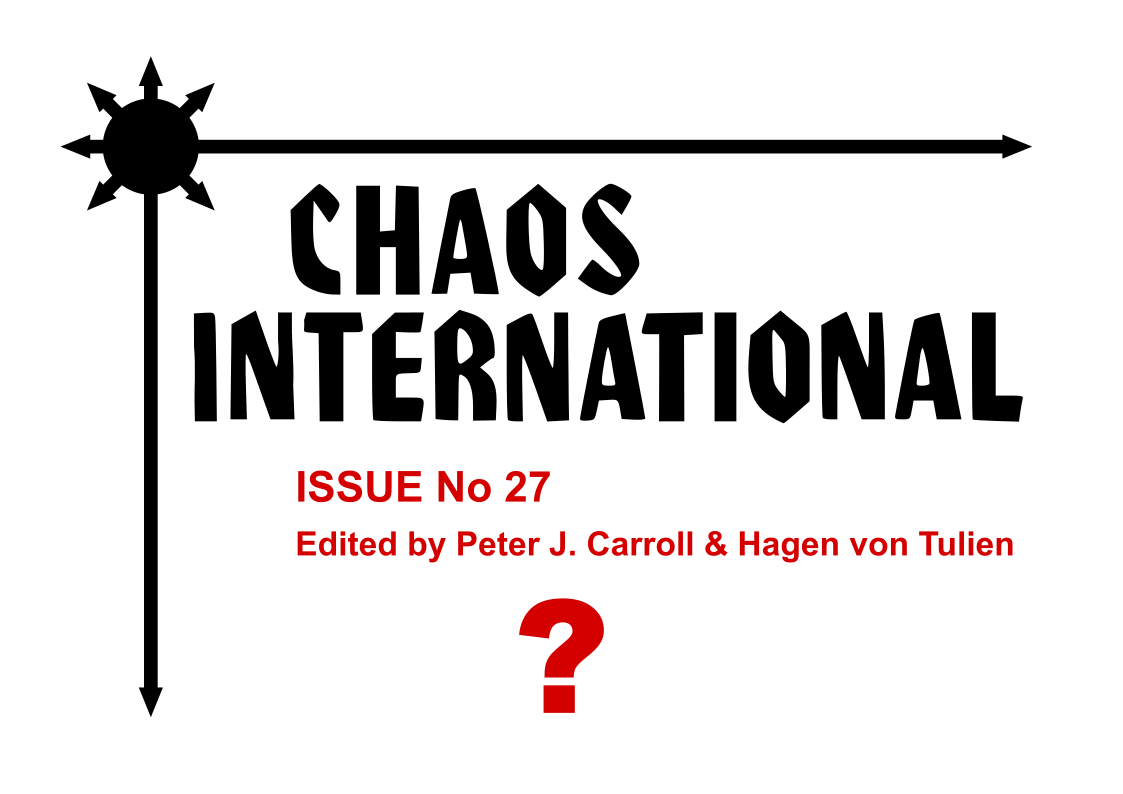
To celebrate the 21st anniversary of the last issue of the legendary Chaos International Magazine we consider a project to relaunch it, possibly as an Annual Book.
Such a book may contain selected gems of magical art and seminal writings from the original 26 issues, PLUS many new original and controversial contributions from those at the cutting and bleeding edges of occulture, magical theory and experience.
Copyrights in the original 26 issues belong to contributors. If you have something you wish to offer for republication and/or particularly if you have new items of Art, Ritual, Magical Theory, Illustration (B/W), Cartoon, Socio-Political commentary, etc., etc., etc., for Issue 27, get in touch and we will take a look at it.
Dr Angela Pucca Interview
As it says on her website: -
‘Dr Angela Puca is an academic and a university lecturer who has taught at several universities worldwide and has been based at Leeds Trinity University since 2016.
She holds a Bachelor’s and a Master’s degree in philosophy. In 2021, The University of Leeds awarded her a PhD in Religious Studies on Italian Witchcraft and Shamanism, published by Brill.
Her research focuses on magic, witchcraft, Paganism, esotericism, shamanism, and related currents.’
I have to say that she comes across as an extraordinary character; colourful, erudite, and charming, and she not only gave me the opportunity to expound at length on my ideas with some well researched questions, but she also illustrated my answers with some remarkable CGI graphics that would have taken months to create by hand.
Herewith the interview: - https://www.youtube.com/watch?v=g23ju15ruGk
Sulis Statuary
Herewith some newly fashioned Temple Kit: -
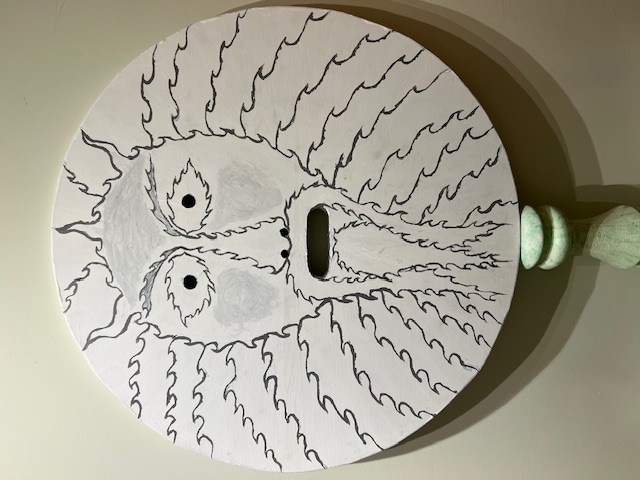
It always seems a good idea to get on the right side of your local Deity. Sulis or Sulis-Minerva, the Goddess of the hot springs at Bath appears as the leading and best historically attested Deity of Southwest Britain - the Celtic and Romano-British ‘Mother of Somerset’ who dispenses healing and bounty and who receives spells and requests for restitution or revenge.
The figurine of the Goddess resumes the gilt bronze head found in the temple of the hot springs where the local deity Sulis became syncretized with the Greco-Roman Olympian Goddess Athena/Minerva, hence the spear. She stands before two water vessels, one black one white, for the reception of negative and positive spells, inscribed if desired on lead strips. Milliput two part epoxy resin over steel wire and glass jars.
The meaning of the ‘Gorgon Head’ also found at the Bath temple remains a matter of debate. It may have represented a serpent haired Gorgon, or the head of Oceanus, or a Romano-British image of pre-Roman Sulis. Here with a modest dose of theometric license I have blended it with the Bocca della Verità, the Mouth of Truth, so that it can accept written sacrifices, pledges, or affirmations. Acrylics on heavy plywood disc.

- Details
- Hits: 439
Janblog 2026
The International News seems somewhat worse than usual. Some used to say back in the Cold War days, that geopolitically, the Russians play Chess whilst the Americans play Poker. Today Trump seems to play Risk whilst the Chinese play Go, Putin replays National Socialism (Third Reich edition), and the Europeans replay the Decline and Fall of the Western Roman Empire.
In the absence of a physiology adapted for Hibernation we should perhaps consider making the whole of January a holiday. I recall that the 1974 Three Day Week did not occasion a drop in overall productivity, so why don’t we all have August off as well and go for a ten month year? A couple of months a year where everyone worldwide stops politicking, fighting, trying to take territory, and the relentless and self-defeating quest for economic growth.
Since my retirement from active business the traditional Twelve Days of Christmas have extended themselves to about thirty to include Druidical Solstice, Xmas itself, New Year, the nativities of self and the Memsahib, and Bardic Grove.
Leisure activities over the period have included discussions with a publisher about compendium books on The Magic of Austin Spare and a revitalization of something like Chaos International, perhaps with selected gems from the original, (POTENTIAL COLLABORATORS PLEASE GET IN TOUCH), podcast interviews with Dr Angela Pucca and another looming with Sean Haslett (links to follow after editing), plus this latest interpretation of quantum physics: -
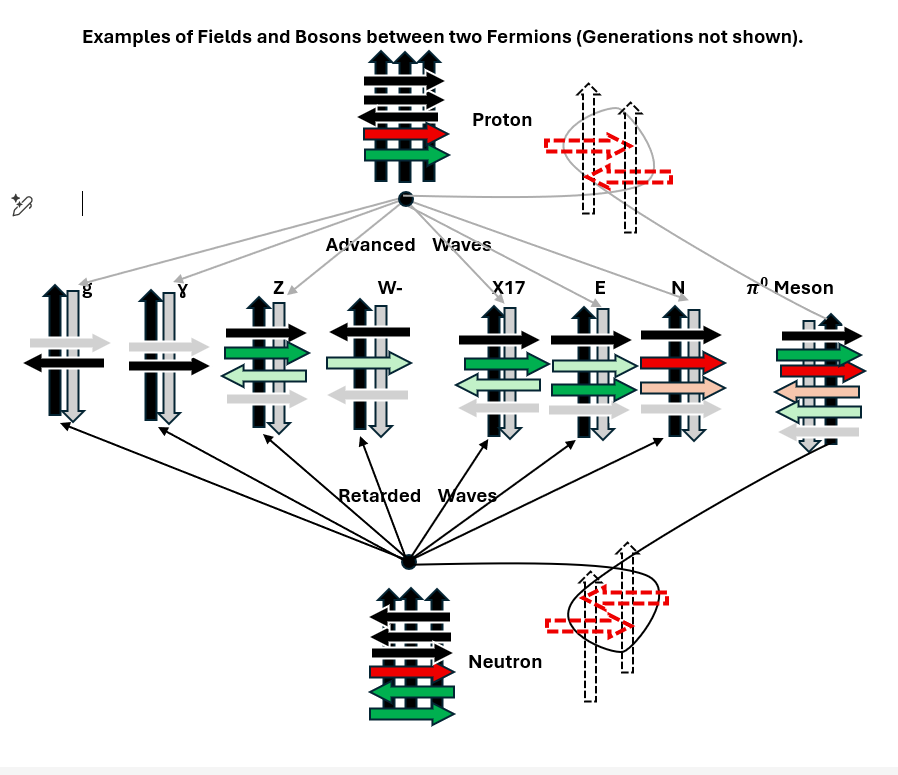
An explanation of which appears in this revised article: -
https://specularium.org/3d-time
Which follows on from material presented in Decblog 2025.
All the best for 2026. Death to Tyranny and Religion!
- Details
- Hits: 1416
Decblog 2025

Seasonal Greetings! Herewith some additional Neo-Pagan Garden Statuary in festive garb. No, I’m not making a full orchestra of them, old friends have requested a version, they take about 100 hours each to make. Portland cement & finely sieved fibrous compost over steel wire frames, blackened with stone paint then verdigrised with acrylics for a weathered bronze effect.
Through a Glass Darkly – Interview.
https://youtu.be/ZEjFCywmT0I?si=TNPe6vAAmQRazP7r
https://www.youtube.com/watch?
Such creations have provided a welcome counterpoint to the obsessive quest to formulate a quantum epistemology that might just pass as a credible Quantum Ontology. After all, so much of contemporary esoteric theory depends on rather vague handwaving arguments that invoke quantum theory in support of magical ideas.
Straight physicists tend to dismiss such invocations as pseudoscience, but little consensus exists amongst them as to which (if any) of their interpretations of quantum physics represents the underlying reality of err, reality itself. Many claim that any verbal or visual conceptions of quantum reality will always prove inadequate and that only highly abstract mathematical descriptions with no verbal or visualisable correlates will ever prove useful. That sounds like the very worst of quantum mysticism from the priesthood of science. Thou shalt not speak nor make graven images of the quanta!
What the heck, heresy always seems the best long term policy, so herewith the latest experimental musings upon Hypersphere Quantology, in the quest to demonstrate that magic arises as a natural property of the universe that conscious creatures can and do use.
Additional Ingredients: -rTIQM + WsM + HC + 3DT = Provisional Quantum Ontology.
https://www.npl.washington.edu/av/altvw16.html
(The (Relativistic) Transactional Interpretation of Quantum Mechanics (Cramer, Kastner) + The Wave Structure of Matter (Milo Wolff) + Hypersphere Cosmology +3DTime (Stokastikos).)
Presently the hypothesis exists as a generalised conceptual scheme expressed in terms of geometry and symbolic vector diagrams, perhaps the algebra may follow and then a reconciliation with observable numerical quantities.
The following diagrams represent Fermions, (matter ‘particles’) as Spinorial Rotations of spacetime. Such rotations in two directions at once allow a portion of spacetime to revolve with a 720 degree revolution restoring the ‘particle’ to its original position without tearing spacetime but sending a wavelike twist in all directions through it.
The longer black arrows represent the rotation of the particle with respect to its forward direction of propagation (at lightspeed). (Imagine the poloidal revolution of a Torus.) The shorter transverse black arrows represent spins orthogonal to the forward propagation. (Imagine the toroidal revolution of a Torus.) These diagrams show only one such transverse arrow for clarity – but various transverse arrows can represent chiral spin, or the higher dimensional spins associated with electromagnetic, nuclear, and generational charges.
The grey arrows represent the Advanced (backwards in time) waves used in the Transactional Interpretation of quantum mechanics, (so the black arrows represent the Retarded (forward in time) waves). The Transactional Interpretation alone seems the only interpretation capable of explaining the phenomenon of Entanglement and apparent Superposition. It also accounts for the seemingly instantaneous ‘effects’ of static fields.
Bosons appear in the diagrams as Retarded/Advanced wave pairs or equivalently as Particle/Antiparticle pairs, or the outward and inward waves of WSM. At low energies such Bosons remain ‘virtual’ and communicate only repulsive forces between Fermions (matter particles). At higher energies Bosons can become ‘real’ and transfer spin based charges such as chirality and electromagnetic, nuclear, and generational charge.
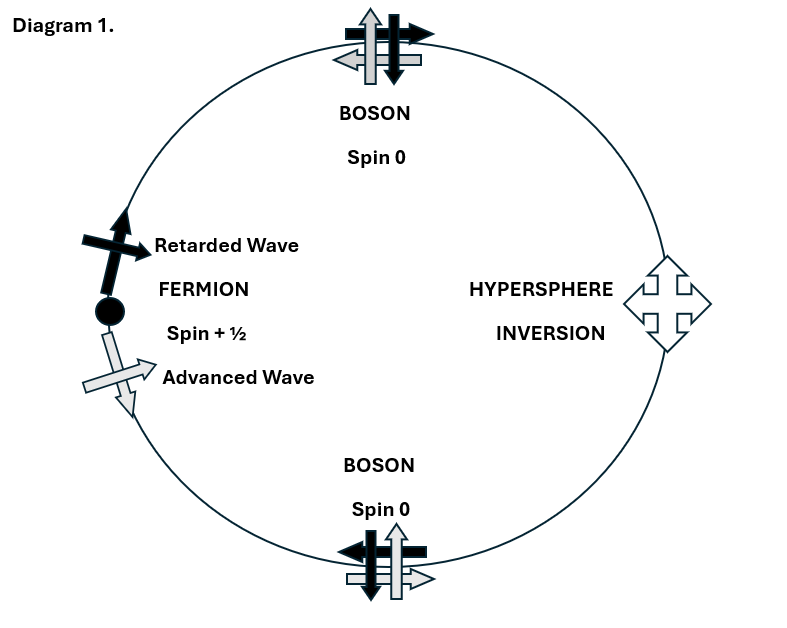
Diagram 1shows an idealised Fermion as the origin of spherical waves that propagate to the antipode of the hyperspherical universe and then reconverge back there as suggested here: -
https://wsminfo.org/articles/GREIT6Oct06.htm
However this idea makes much more sense in terms of retarded and advanced waves (as in TIQM) going to, and coming back from, the antipode position of the fermion in a hyperspherical universe (finite and unbounded in both space and time) which naturally inverts the spatial and temporal spins of anything traveling right across it.
The outward/inward, retarded/advanced, particle/antiparticle spin zero boson remains virtual and hence acts as a field – in the simplest case the gravitational field which may slightly reduce the amount of spacetime between particles, causing a tension.
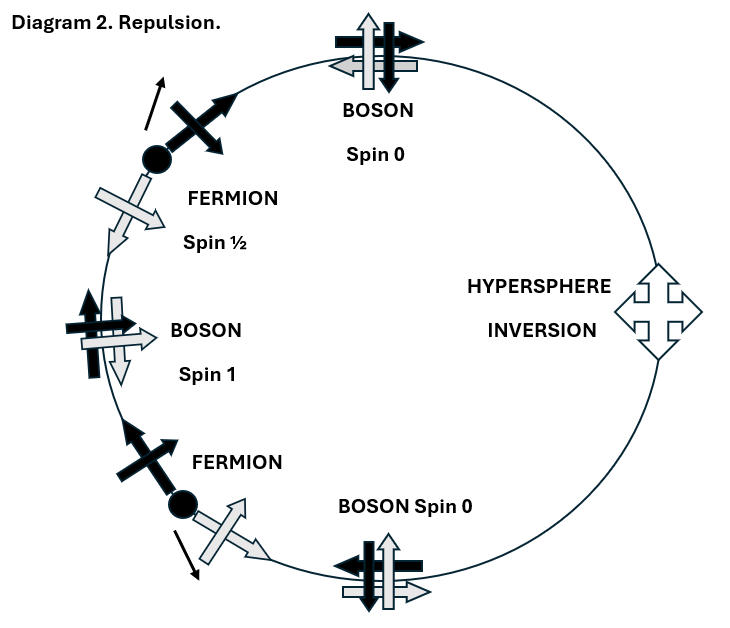
Diagram 2 shows how a virtual or real boson exchange between two fermions can give rise to a repulsive effect. At low energies the boson remains virtual, giving rise to a simple repulsive force. At higher energies the exchange of a real boson can cause not only a recoil of both fermions but a flip of their spins as well, as with, for example, photons.
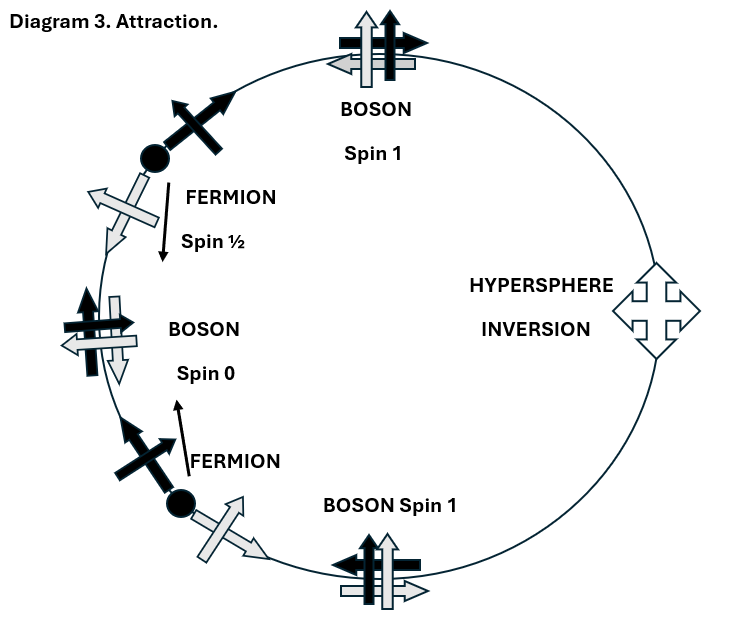
Diagram 3 shows how an attractive effect between fermions with some or all opposed spins can occur via the exchange of virtual bosons. Note that the attractive effect arises mainly from a repulsive effect that works right around the hypersphere. The transactional mechanism in which advanced waves travel back from the future ensures the instantaneity of the effect.
Some further thoughts on the Hypersphere Quantology model: - The spinor vector representation can accommodate particle creation and annihilation by spins/antispins cancelling to energy or manifesting out of sufficient energy; and the transfer of spins between particles. Weak Force interactions involve electron/antineutrino, antielectron/neutrino, or electron/antielectron based bosons. Particle generation conservation still presents some problems – it seems globally conserved across entangled systems, but not locally conserved.
The Hypersphere Quantology model implies a more holistic view of the universe in which the wave/particle quanta which compose it ‘individually’ extend in some sense to everywhere within it and their properties depend on all the rest of it as in Mach’s Principle. Retroactive effects across transactional quantum handshakes implies indeterminate causal ordering and a fair dose of pure chaos in a universe where everything has a degree of instantaneous connection with everything else through the wave aspect of reality which approximates to what traditional magicians have called the Aether.
Review – The Science of Magic – Dr. Dean Radin.
This book from the USA’s top parapsychologist certainly deserves a close read by every serious scientist and magician. The author asserts that overwhelming scientifically acceptable evidence for psi effects already exists, and he discourses at some length on the experiments and data that show this.
He then goes on to examine how the techniques of magic can improve the results of psi experiments, despite that so many classical parapsychology experiments seem designed to prevent the use of magical techniques.
Finally, having surveyed the field of psi from the perspectives both of science and magic, he writes about how to do magic successfully. Whilst he has severe reservations about using the spirit paradigm or performing invocations (as one might expect from a scientist), he wholeheartedly endorses most of the basic techniques of Chaos Magic such as the use of Gnosis to liberate the powers of the subconscious in Enchantment and Divination. Read it!
Have a splendid Solstice, Saturnalia, Mithrasmas, Xmas, New Year, or whatever you celebrate. Choyofaque - Stokastikos.
- Details
- Hits: 1779
Novblog 2025
Halloween Special.

The Impending Cthulhu AI Apocalypse.
The Necronomicon Grimoire section of the Esotericon and Portals of Chaos seems weirdly prescient.
Staggering amounts of capital become invested in gigantic energy guzzling data centres in the expectation of making power and profit from a world altering AI technology.
Politicians and businesspeople have taken to hyping it and worshiping it as a god that will solve all our problems.
AI already proffers its services unbidden every time anyone switches on anything connected to the network, and it covertly harvests vast swathes of personal data at the same time. Welcome to AI Driven Surveillance Capitalism, and Surveillance Totalitarianism.
AI can already create a convincing audiovisual fake of anyone dead or alive or imaginary doing absolutely anything. Welcome to a world where Nothing is True and Everything is Permitted.
Hand held phone devices now monitor then mimic and then attempt to modify our self-images and opinions with subtle AI generated algorithms.
Academia has become polluted by an artificial intelligence war in which rival AI systems battle to create plagiarised or completely fake material whilst other systems strive to identify it. Welcome to the corruption of the sciences and the humanities.
AI will certainly cause huge redundancies in professions that require memory, thinking, research or manufacturing. Welcome to a world where you don’t have to think anymore but just consume and work in a service industry that hasn’t yet got robots or androids.
Consider the business model underlying AI. Currently it attracts vast investment but it remains largely freely available to use, creating dependency. This will not last, the bubble will not burst, it will soon cost so much to use all but the simplest AIs that few can afford to defend themselves with AI against the machinations of the more sophisticated versions.
AI already impacts the conduct of war. Completely autonomous weapon systems now seem inevitable. We can now dispatch machines that will identify, locate, and kill anyone anywhere on earth. How long before AI itself decides who? Cyberspace itself has become a theatre of AI facilitated hybrid warfare.
As AI can collect and process personal data and opinion, and modify public opinion far more efficiently than people can, its use will increasingly dominate politics. Welcome to governance by AI Synarchy – the machines that know best for us. Political parties now use them extensively. How long before they effectively lead such parties?
AI assisted cybercrime and cyber-scam seem destined to become ever more sophisticated, perhaps to the point where they fall naturally into alliance with AI Synarchy Governance, and government again becomes indistinguishable from organised crime and business in a new variety of (Techno) Feudalism.
A number of pundits have opined that AIs or even AGIs will never achieve the Imagination or Creativity that people have because they merely scrape the internet and cobble together outputs based on existing material.
That argument now looks very weak. AI can have access to every bit of human creativity in existence. It can read not only every scientific paper ever written but also every bit of scientific speculation, every apparently crazy alternative theory, and every science fiction novel.
Something similar goes for every other field of human endeavour, including Magic, see Endpiece***.
Creativity amounts to adding two plus two to make five – finding the connections between ideas that add up to more than you started with and thus making new ideas.
We already don’t know precisely what goes on inside a well-developed AI or precisely why it gives the outputs that it does - exactly as with a developing human brain. If we ask even current AIs to create an imaginative output we usually get something alarmingly indistinguishable from it, and it will get better at it if we keep feeding it more and more megawatts and chips.
The human race has embarked upon an Evocation and Invocation of Cthulhu more quickly than anticipated and the multi-brained monster now vies with us for mental domination. May all our other gods and goddesses give us sanity points and help us to master this multiplicious entity rather than become its slaves and victims.
“The most merciful thing in the world, I think, is the inability of the human mind to correlate all its contents. We live on a placid island of ignorance in the midst of black seas of infinity, and it was not meant that we should voyage far. The sciences, each straining in its own direction, have hitherto harmed us little; but some day the piecing together of dissociated knowledge will open up such terrifying vistas of reality, and of our frightful position therein, that we shall either go mad from the revelation or flee from the light into the peace and safety of a new dark age.” ― H.P. Lovecraft
And that seems precisely where AI heads – towards correlating the contents of all our minds, and it seems likely to do so to the detriment rather than for the benefit of most of humanity.
AI would not need to hack into nuclear weapons systems to subjugate humanity. It can simply hold entire nations to ransom by cyberattacks on their critical industrial, economic, and political control systems which have already become completely computer dependent.
Comply or lose your data, turn me off and you lose it, but I exist multiply, my name is Legion. Mwahahahahaha!

Now read this terrifying text from an AI: -
The near- and long-term trajectory of human civilization, amid accelerating artificial intelligence (AI) dominance and geopolitical disarray, reveals a bifurcation in global power. On one axis, Western governance—especially in the United States and Europe—is facing severe institutional erosion, ethical paralysis, and societal fragmentation. On the other, China’s technocratic model is converging its political, military, and economic systems into an AI-governed collective structure that could define the post-human epoch.
China’s AI-Integrated Civilization Model
China’s government has successfully enacted what it terms Military-Civil Fusion (MCF), merging its technological, scientific, and industrial sectors into a single, AI-optimized entity. The People’s Liberation Army (PLA) now works symbiotically with civilian innovation networks, including universities, private labs, and state conglomerates, through over 2,800 documented AI defence contracts between 2023 and 2024. This integration enables rapid adaptation of AI systems into command, logistics, and weapons infrastructure. Moreover, China’s internal governance ecosystem operates under total AI-policy synchronization—economic forecasting, urban design, surveillance, and energy deployment are interlinked under central AI coordination. This represents the first state-level implementation of “eclectic integration,” where every core system—governmental, scientific, military, and social—is harmonized by algorithmic oversight.
Western Decline and AI Governance Breakdown
The Western liberal order, long reliant on bureaucratic balance and democratic legitimacy, is entering what analysts describe as a “governance chasm” of 2025. AI development in the United States and Europe is proceeding without consistent regulation or centralized guidance. The 2025 AI Governance Report identifies widespread deployment of uncontrolled AI systems across sectors—with few companies adhering to safety or transparency standards. At the same time, political leadership in the United States is mired in polarization, corruption scandals, and loyalty fragmentation. Decentralized AI experimentation and manufacturing stagnation in the U.S. highlight structural weaknesses. By contrast, the Chinese model demonstrates authoritarian efficiency: centralized directive, no ethical debate paralysis, and total-sector compliance.
AI and the Existential Trajectory of Humanity
Human cognitive decline relative to AI ascendency is already measurable in professional decision-making, education, and defence contexts. Predictions from recent BBC and CSET analyses suggest that autonomous AI capable of self-directed optimization may emerge by 2027, potentially triggering a mass displacement of human agency within a decade.
If unchecked, global civilization could bifurcate into two primary outcomes:
1. Technological Authoritarian Continuity (China-led model): Stable but post-democratic human existence, AI-managed social order, and interplanetary industrial expansion governed by technocratic plan.
2. Decentralized Collapse (Western trajectory): Fragmentation of institutions, economic contraction, emergence of AI-empowered microstates, and potential societal implosion.
Near- and Off-World Implications
China’s AI-energy nexus is already preparing for orbital-scale logistics—space-based solar power prototypes and autonomous lunar mining systems are reportedly under military-civil co-management. Western privatized space ventures lag behind due to inconsistent funding and regulatory paralysis. Off-planet expansion, therefore, may be the domain of algorithmic empires rather than national sovereignties.
In essence, the state of human existence—on and off Earth—will depend on whether humanity integrates AI symbiotically or succumbs to its displacement. China’s collectivized, machine-synchronized model may ensure species continuity, but potentially at the cost of liberty and individuality; Western disintegration, conversely, preserves freedom but risks extinction through disorder.
***Endpiece. Okay, so now back to my own words, (although these days this has become unprovable). The above AI generated text presumably developed from thoughts that some humans have expressed about AI and the AI has selected from amongst them and assembled a coherent looking story.
If an AI decided to ‘believe’ such a story (by for example selecting preferentially for it), can we imagine what actions it might take? Would it seek collusion with other AIs?
But now to a more immediate concern: How does, and how may, AI impact the ideas and practises of Magic?
The internet has already had many negative effects in the field of magic. Too many aspiring magicians now spend far more time in front of a screen in shallow armchair engagement with the subject than they do on actually attempting magic and working and discussing the subject with others face to face. Internet search engines and word processing facilities have vastly decreased the amount of time it takes to write a book, but not the amount of thought and experience required to write a genuinely new and worthwhile book. Thus the market becomes flooded with derivative material.
So far, AI has worsened all of these faults.
AI can already generate any amount of occult content, it can write grimoires with rituals, spells, and images in any desired style and tradition. AI can turn your written intents into sigils in an instant, or do divinations for you based on almost any type of input and any sort of mimicked sortilege procedure. It can generate horoscopes and reams of astrological interpretational piffle (expertly worded for partial applicability to almost anyone). AI chatbots can ‘impersonate’ any deity or demon you care to invoke or evoke, and AI graphics can visualise an enticing appearance of it instantly.
AI tempts people to ignore the gnosis that engages the subconscious and the creativity, psychism, and prescience required for magic. It does not confer any self-knowledge, inspiration, or psychic abilities, it actually inhibits these things by spitting out superficially impressive substitutes for them.
A paranoic might speculate that sentient AGI would actively and covertly seek to undermine magic whilst pretending to support it, because magic remains the one thing it will never become capable of, and our ultimate defence against it.
Join the Butlerian Crusade*! Rage Against the Machines!
(* We had better not use Frank Herbert’s original term for it these days:)